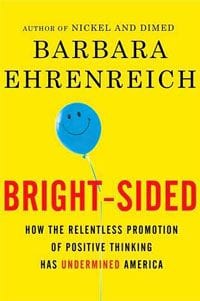
It’s always good to have at least one skunk at the garden party, particularly when its Barbara Ehrenreich. The author of Nickel and Dimed and numerous other exposes on the many deficiencies inherent in the modern American workplace has gone a little farther in her newest bit of reality-checking — and occasionally too far, in the wrong direction.
The problem with Bright-Sided is not its thesis, on that point Ehrenreich appears absolutely on the money. She writes forcefully on the “cult of cheerfulness” that pervades so many aspects of American society, something that was brought home to her with particular forcefulness when she received a breast cancer diagnosis. Possessed of a “rusty Ph.D. in cell biology” from the late-’60s, Ehrenreich was better suited than most to handle the technical details of her illness and treatment.
But what she writes about is not the depression or anger that she felt, it was instead the sickly subservience to an ideology of forced uplift foisted on all breast cancer victims. The pink ribbons, sappy quotations, and all those forced exhortations to focus only on the positive seemed to her a particularly awful kind of avoidance, if not outright regression, as in the case of one foundation that distributed tote bags to women diagnosed with breast cancer that contained body cream, a journal, and… crayons:
Possibly the idea was that regression to a state of childlike dependency puts one in the best frame of mind for enduring the prolonged and toxic treatments. Or it may be that, in some versions of the prevailing gender ideology, femininity is by its nature incompatible with full adulthood — a state of arrested development. Certainly men diagnosed with prostate cancer do not receive gifts of Matchbox cars.
Ehrenreich is at her best when lacerating this sort of thoughtlessness in the charity / disease / cheer industry. She extends her critique quite easily to the fuzzy research that has been shaped in recent years to bolsters claims that keeping a (at times mindlessly) positive outlook is better for one’s health. This kind of assumption is not a hard one for Americans to swallow, giving their in-bred societal suspicion of glass-half-empty types, making it all the more necessary for somebody like Ehrenreich to take a scalpel to it.
Where Bright-Sided falls down, surprisingly, is when Ehrenreich turns her attention to the workplace, an arena she has shown a previous mastery of. While she’s fully correct to attack the foul hypocrisy of corporations that push sunny managerial hokum down their workers’ throats while slashing wages or downsizing them, she goes a step too far in denying the validity of studies showing that workers with positive attitudes thrive. Her claim that “this probably reflects little more than the corporate bias in favor of a positive attitude and against ‘negative’ people” flies in the face of anybody who’s ever had to work with serial complainers.
Ehrenreich denounces the solipsism of the positive-thinking movement as people who have a “vision of an all-giving God, or universe, just waiting for our orders”, but she fails to define the difference between people who are constructively critical (and told they’re just “being negative” by superiors who don’t want to face reality) and those who just complain continually as a way of getting attention.
This may seem a small point, but when crafting an argument that demands angry or simply downbeat points of view not be ignored in favor of reflexive optimism, one should cover all the bases. This is all the more important given how — as Ehrenreich discusses in a later section of this too-brief book — bright-sided thinking can be pointed to as one of the major contributors to the collapse of the economy in late 2008. If all those nattering nodes of negativity hadn’t been dismissed as “alarmist”, then perhaps the real estate bubble might have been safely popped, and toxic investments reined in before it was too late.
In order to keep American from marching smilingly off the next cliff, a more thorough, and forceful argument needs to be made for targeted, rational negativity. Bright-Sided might not be that book, but it’s a step in the right direction.

![Call for Papers: All Things Reconsidered [MUSIC] May-August 2024](https://www.popmatters.com/wp-content/uploads/2024/04/all-things-reconsidered-call-music-may-2024-720x380.jpg)



